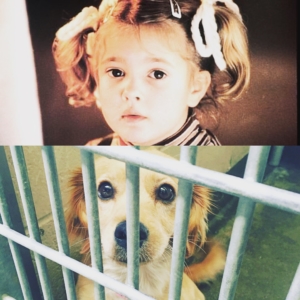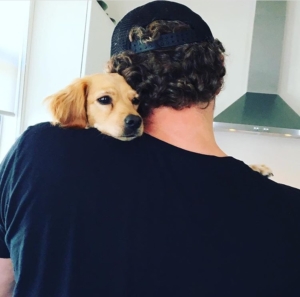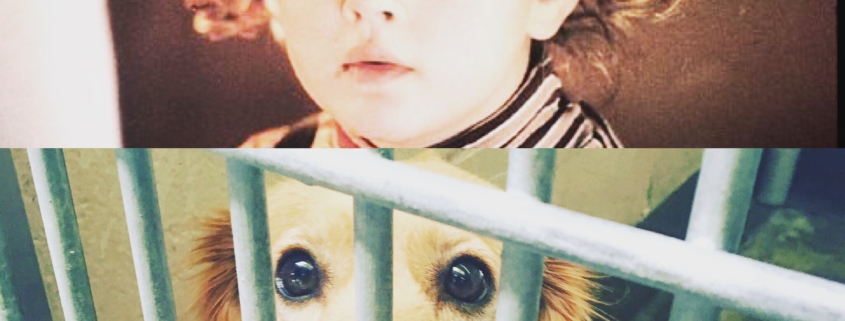DARPP-32, I Forgive You
I equate dogs with death.
My father brought the family dog home from his firehouse in the South Bronx. The dog was lonely, tired, and hungry, abandoned in one of the worst neighborhoods in the universe, one rampant with crime, drugs, homelessness, and endless flames. I wish I knew how the dog befriended my father and why he eventually brought her home, because it was the most heroic thing he ever did, at least for me. We had no relationship. We fought bitterly. I never understood him.
The dog, however, brought me extraordinary happiness. I was around 8-years-old when we became soul mates. She was a small, caramel-colored mutt, with a long torso like a dachshund, but taller and plumper. She used to wait for me at the gate to the schoolyard every day after school. One day, a few weeks after we’d acclimated her to her new home, my mom and I saw her leaping across the yard from the kitchen window. “Look,” she said. “She’s leaping. Like a deer.” In airy graceful arcs, she soared across the yard. “It’s Bambi!” And that’s how she got her name.
We frolicked through the neighborhood fields, she slept on my bed, and when she had her two litters of puppies, I was the only one she’d let near her while small, squeaking slime-loves in placenta sacks slid out of her. Her eyes were almond-shaped and syrup-dark, soulful and preternaturally perceptive. I loved her.
Sometimes when my father stood in the kitchen or the garage or out by the pool, I would watch him: I needed to look at the man who had brought me home a dog.
Seven years later, she was put to sleep. I was 15-years-old and devastated. I fought bitterly with my mother about it; she’d had Bambi put down due to incurable uterine cancer. I was neither given a say in the matter nor an opportunity to say goodbye to her.
“You’re horrible,” I yelled at my mother.
“Probably,” she answered, “but letting her suffer is more horrible.”
“You’re insane. You’re a terrible parent.”
“Probably,” she said, and cried. “But I was trying to spare you from the pain.”
Bambi’s demise had a snowball-death-effect: First, my mother’s diagnosis of Stage 4 cancer and her death a few months later. I was neither given a say in the matter nor an opportunity to say goodbye to her. Later, I lost two siblings, some friends, and eventually, my father, who died on my birthday.
It was as if the dog’s passing was a metaphysical rabbit hole I chased her down, and have been stuck wandering through a Wonderland-in-Extremis ever since.
During our years of doggie/human companionship—Bambi & Timmy forever!—I was very happy, yes, but I noticed more easily the things around me that were anathema to my good feelings. This included the cruelty of kids who appeared to live for one reason only: to call me a piece of shit faggot loser who was going to die of AIDS and burn in hell.
“You should be murdered,” they would say to me, mashing cafeteria pizza into my face. “Just kill yourself.” Then they’d kick me in the shin.
The other thing I noticed was the extraordinary anger of my father. He was a quiet guy, for the most part. Tall, handsome, sometimes amiable. But then he would drink, and rail, and his Irish begrudgery would rear its beery head. A mess of angry red clovers would encircle him like a deranged halo. He despised anyone with money—politicians, lawyers, doctors, anyone who was black, Latino, Asian, gay, or Jewish. His anger terrified me. If he got mad at one of us six children, he would blow a fuse: scream, jump up and down, fists raised, his face as red as blood spilled by the IRA. His voice would take on a pallor and a pitch that revisits me in nightmares to this day.
* * *
Fast forward nearly thirty years.
After my partner and I purchase a house in Silverlake, we begin the hunt for some little thing we can love and nurture. This fills me with both elation and dread: Is this, perhaps, the first step toward deciding whether or not I want to be a parent?
After weeks of fruitless searching, we visit the kill shelter near Dodger Stadium and are surprised to discover a dog that looks like a miniature Golden Retriever (in actuality, she’s a ‘cocker-doxie’ or ‘docker’ but we find that out later). In an overcrowded shelter rife with abandoned pit bulls and sad Chihuahuas, this little dog is a diamond in the rough. We have to bid on her in a silent auction because many people want to adopt her. We win the auction and my heart drops: Shit. Wait—I don’t want this. I can’t do this. No, no, no, no… We’re walking across the lobby of the shelter toward the main desk to sign the paperwork and pay our fees: my mouth is dry, my hands are shaking, and beads of sticky sweat slip out the skin of my forehead. What is happening? Am I going to pass out?
As the walls close in all around me, I am distracted by a sound…a familiar melody…and at the moment, the sound—a song—flicks on a light-switch in a dark room of my soul. I grab Paul’s arm and he says, “What?” and I say, “Listen!” The PA system plays A-Ha’s 80s mega-hit “Take On Me”. It was my mother’s favorite song of all time. I only ever hear it when she wants me to hear it. “It’s a sign,” I say to Paul. My eyes glisten.
* * *
We want to name her after a sci-fi heroine. We consider Ripley or Newt from Aliens, Ellie from Contact, Scully from The X-Files, Neyteri from Avatar…. We land on Gertie, after the little girl from the film E.T. The Extra-Terrestrial played by a young Drew Barrymore, because this little dog just owns that cuteness, that spunk, that golden innocence, and vulnerability. If you were to open this dog up, you’d find warm cream-puffs.

Gertie in “E.T.”, and “Gertie” at the shelter.
Giddy as a kid in those first few days after adopting this wondrous being, something suddenly shifts, and my heart hardens. I have no patience for the lack of control that comes with the ownership of a new dog, and I begin to have an epic meltdown. When she won’t eat the food I give her, I nearly kick the refrigerator doors. When she won’t pee and poo in the early mornings when I walk her around our neighborhood, I shove my fist into the trunk of a tree. When she craps on the rugs of our new house, I feel my body literally quaking with indignation.
Over the ensuing first days with the dog, I scream at her, fists raised. I jump up and down. My face is red as blood spilled by the IRA. The insolence of this dog! And this utterly adorable little creature bursting at the seams with love and cuteness looks up at me, confused and afraid, then cowers with sad eyes in a corner and trembles.
When I jump up and down screaming my head off, on the verge of giving myself a stroke, I see a movie in my mind, a memory: my father, when he attacked me on the phone after I first arrived at NYU and received the first-semester tuition bill. He did not want to pay for my education. He called me a “stinking fucking son of a bitch loser” and screamed his head off on the other end of the phone.
Another time, I am so enraged at Gertie for darting into the street to catch a squirrel that I lift a hand to smack her on the snout, but catch myself in the nick of time, “you’re having an Exorcist moment,” I tell myself. In that green vomit of realization, I flash to the time that my dad brought down one of his golf clubs on my hands because I wanted to wear his Fireman’s coat and hat for Halloween one year. I couldn’t hold a pencil in my hand to do my homework for days.
I try to breathe. I try to think. What do I do? What does this mean? I’m lost.
* * *
We give the dog, temporarily, to our dear friends Stacy and Jonny and their 11-year-old daughter. (Stacy and I met at NYU and danced around the world together. If you ever want to know if you can trust someone intrinsically, dance on stage with them.) She says they will consider taking her if we decide not to keep her.
Enraged, confused, and broken, I research the science behind anger, and whether it is an inherited trait. According to a Science News article called “Anger is in the Genes” that appeared in The Telegraph, “Isolation of a gene called DARPP-32 (dopamine-and cAMP-regulated neuronal phosphoprotein) helps explain why some people fly into a rage at the slightest provocation, while others can remain calm.” (Irvine, web)
My DARPP-32: isolated af.
My worst fear come true: Have I become my father?
No one knows any of this. I speak no words about my struggle with anger and the dog. Not to Paul, not to my friends, not to my therapist. I keep it hidden, a low dark secret; the scum-layer at the bottom of a puddle on a street in a slum.
After we give up the dog, I burst into tears several times a day: in the car, in the bathroom at work, on the treadmill at the gym. My body, racked with deep, heaving sobs, will not let me sleep: How could you give that dog away? You stinking fucking son of a bitch loser. You should murder yourself, you worthless faggot AIDS-spreader.
Have I come so far in life only to tumble back down into that Wonderland of Mad-hatter horrors? My essence feels poisoned by my father’s anger, my bullies’ venom.
And then, I get it: I equate the dog with death. With loss. Trauma. Fear.
This golden little heart-melter, the most adorable dog in the history of the world, has transmogrified into a snarling colossus of existential misery. My subconscious is saying NO to chasing a White Rabbit down a hole of despair again. NO.
And after about five days with this bull’s ballsack in my face, I find myself in a paddle-boat with Paul on Echo Park lake, the cold fountain spray misting our faces. I turn to him: “Let’s get her back. Right now. I can’t live without her.” We wipe away the water and paddle to shore.
Soon as she sees me, she runs into my lap, curls up in ball, and sighs. We all know then that she is mine.
* * *
Gertie has dissolved the green-gray smog layer of anger for me. She is the cool air after a fresh rain. My DARPP-32 is regulated by dopamine again, not lost in a slithery Cheshire forest.
I know, I know: you too have seen those cheesy bumper stickers that say, “Who Rescued Who?” with a little doggy paw. It’s a total cliche. But…is it?
I find it ironic that my father brought Bambi to me in the first place: she brought me love and happiness; then she led me through the gates of death where I wandered in the land of loss for years while my family was literally halved; later I felt the desire to own a dog, and that dog brought back anger, misery, and sorrow—conflicts I had to face in order to begin the process of gaining back the family I had lost by creating one of my own.
Dad, I know you didn’t willfully choose to pass down isolated DARPP-32s. It’s not your fault, and I forgive you.
I forgive you too, DARPP-32s.
I had a dream recently, one that prompted the writing of this essay: I met a wizard in an indoor public swimming pool, and he said, “I’ll show you anything you want to see.” I answered, “Show me what I need to see”, and he pulled a waterproof fanny-pack up from under the chlorinated bubbles and unzipped it. He pulled out two photographs and smiled at them, then flipped them around and showed them to me: one was of Bambi, the other of Gertie.
“Pictures of your father,” Pool Wizard said.
Nodding, I said, “How true.”

Gertie and Timmy forever!

Tim Cummings is a current MFA candidate in Creative Writing at Antioch University Los Angeles. Recent publications include F(r)iction, Lunch Ticket, Meow Meow Pow Pow, Los Angeles Review of Books (LARB), and ANTHOLOGY: The Ojai Playwrights Conference Youth Workshop, which he compiled and edited for his Field Study. He holds a BFA in Acting from NYU and is the recipient of two LA Drama Critics Circle Awards, two SAGE Awards, an LA Weekly Award, and a StageSceneLA Award for Performance of the Year.





